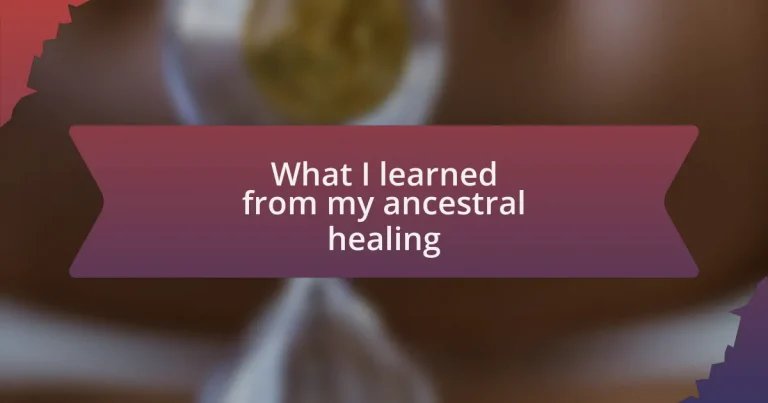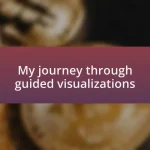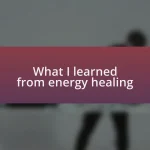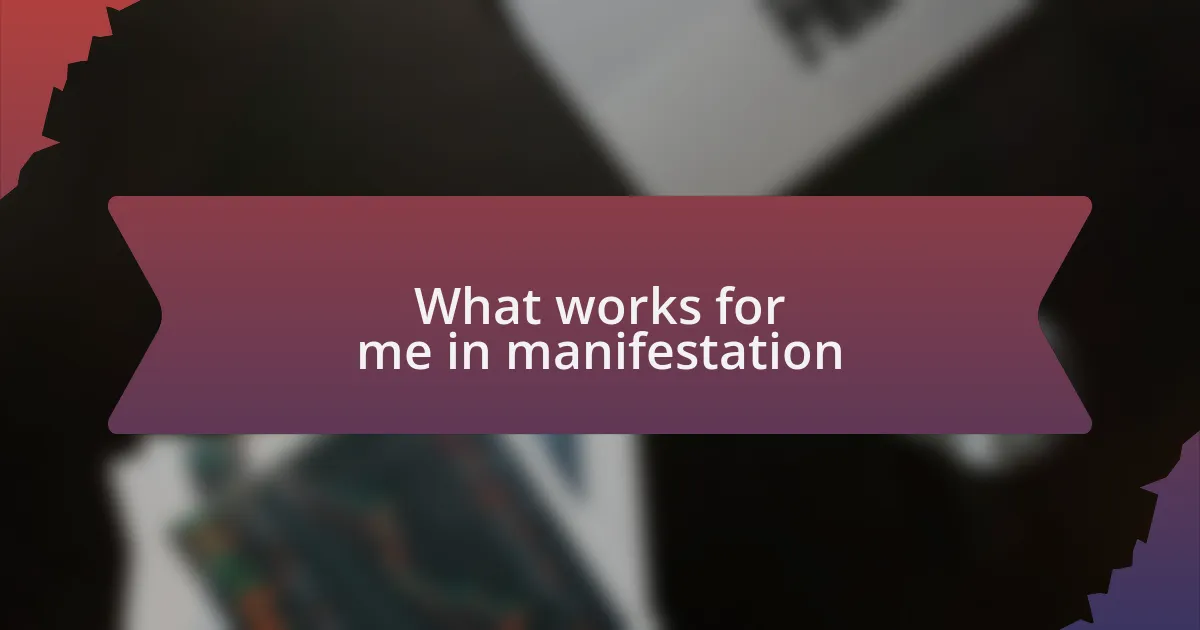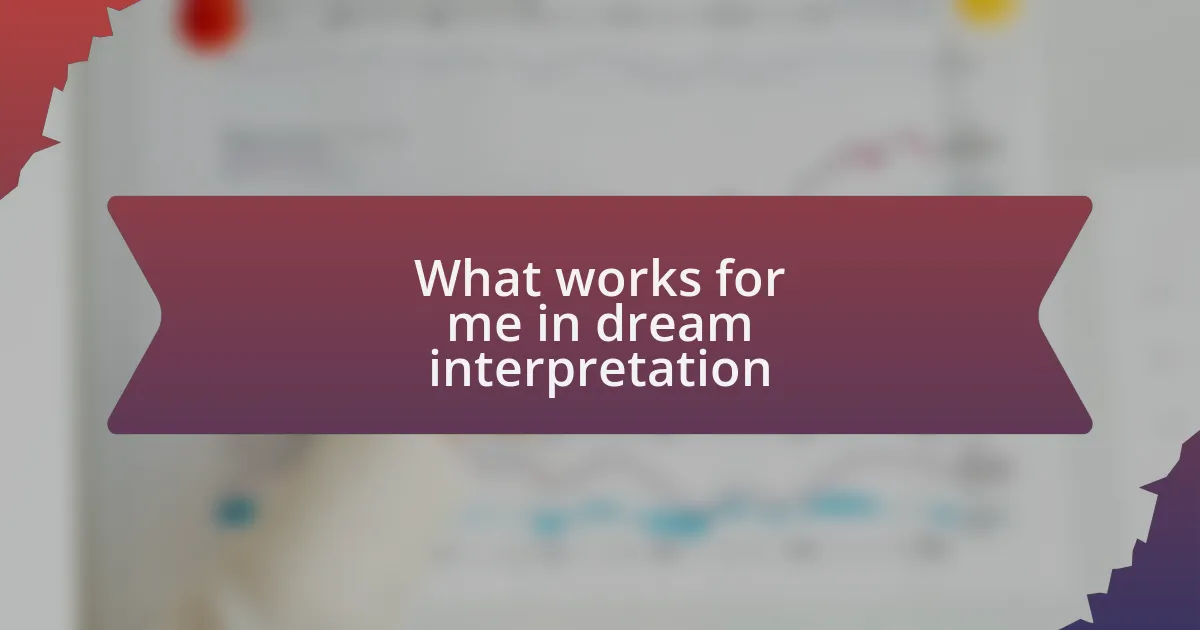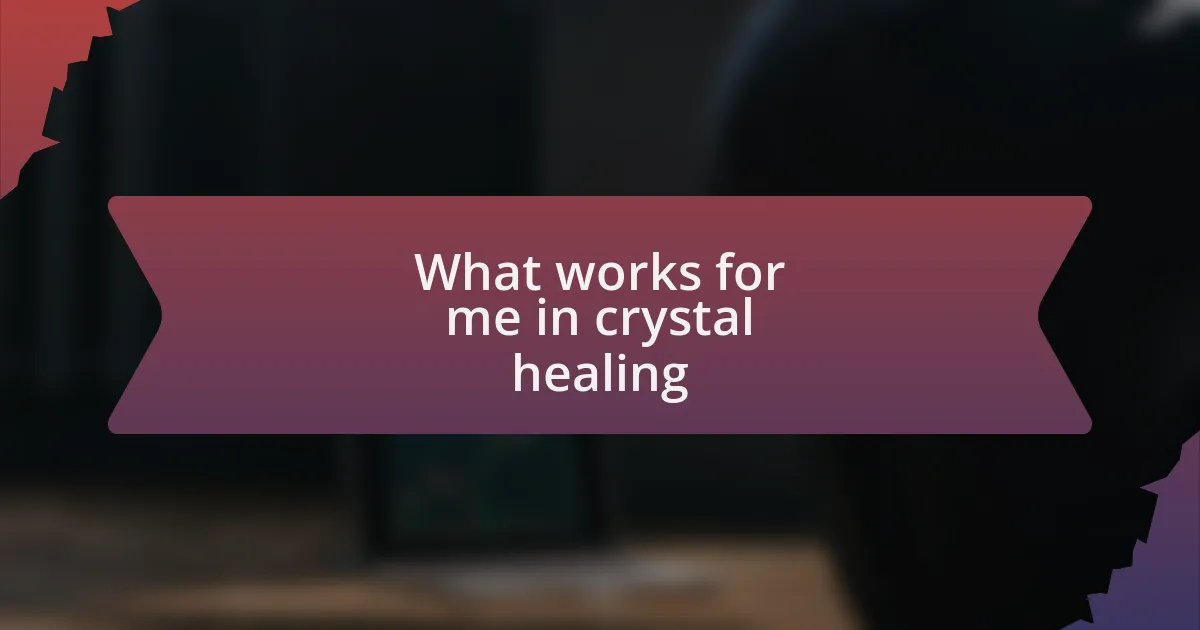Key takeaways:
- Ancestral healing involves reconnecting with lineage to understand unresolved traumas and inherited patterns that affect personal growth.
- Engaging in practices like journaling, meditation, and ritual can help illuminate hidden family stories and foster emotional freedom.
- Exploring family history creates a deeper sense of identity and belonging, while also empowering individuals to carry forward ancestral resilience.
- Understanding ancestral experiences can reveal both inherited strengths and unresolved pain, promoting healing and forgiveness within family dynamics.
Author: Evelyn Hartman
Bio: Evelyn Hartman is a contemporary author known for her evocative storytelling and rich character development. With a background in psychology, she weaves intricate narratives that explore the complexities of human relationships and personal growth. Her debut novel, “Whispers in the Wind,” garnered critical acclaim and established her as a powerful voice in modern literature. Evelyn resides in the Pacific Northwest, where she draws inspiration from the vibrant landscapes and diverse communities around her. When she’s not writing, she enjoys hiking, gardening, and spending time with her two rescue dogs.
Understanding ancestral healing
Ancestral healing is about reconnecting with our lineage and understanding the unresolved traumas that may affect our lives today. I remember when I first delved into this practice; it felt like opening a door to a room I never knew existed. Has anyone ever told you that you carry the weight of your ancestors’ experiences?
Through this process, we often uncover layers of family stories that reveal not only struggles but also strengths passed down through generations. I once discovered that my great-grandmother had endured significant hardship, yet her resilience inspired me to confront my own challenges. How often do we recognize the courage in our family’s past and let it inform our present?
Engaging in ancestral healing can be a transformative experience, helping us break cycles of pain and suffering. I felt an overwhelming sense of liberation when I addressed some of these inherited patterns in my life. Isn’t it fascinating to think that by healing ourselves, we can also begin to heal those who came before us?
Benefits of ancestral healing practices
One of the most profound benefits I’ve experienced from ancestral healing practices is a heightened sense of self-awareness. As I traced my family’s history, I stumbled upon recurring themes of fear and anxiety that seemed to echo through generations. It made me wonder how much of what I felt was genuinely mine versus a burden inherited from ancestors who never had the chance to heal.
By acknowledging these ancestral patterns, I found a pathway to emotional freedom. I recall the moment I recognized my grandmother’s fear of abandonment, which I realized I had absorbed. Have you ever felt like you were living out someone else’s fears? By breaking this cycle, I felt lighter, more in control of my own life and decisions.
Additionally, connecting with my lineage provided a sense of belonging and purpose that I didn’t realize I was missing. I remember standing by an old family photo, feeling the energy of those faces and their stories. It made me ask: How do the experiences of my ancestors shape my goals today? Embracing their triumphs and struggles has not only deepened my identity but has also inspired me to carry forward their legacy of resilience with pride.
Techniques for ancestral healing
When I first began exploring techniques for ancestral healing, I found journaling to be particularly effective. Writing down my thoughts and emotions while reflecting on my family history allowed me to uncover hidden traumas and connections. It’s fascinating to see how pen and paper can help untangle feelings that may originate far beyond my own experiences.
Meditation also became a pivotal practice in my journey. As I sat in silence, I visualized my ancestors standing behind me, offering wisdom and guidance. It was almost surreal—like they were filling the room with their presence, urging me to listen. Have you ever experienced such a powerful connection during meditation? I felt their strength guiding me towards healing, helping me to process inherited emotions.
Furthermore, I discovered the power of ritual and intention setting. I created a small altar with photographs and tokens that represented my lineage. Lighting a candle and speaking words of gratitude allowed me to honor their struggles and victories. This act of remembrance transformed my experience; it was not just about acknowledging my heritage but actively participating in a dialogue with it. What rituals resonate with you? I’ve found that the simplest actions often hold the most profound meanings in our healing journeys.
Insights from personal experiences
Reflecting on my experiences, I realized that understanding my ancestry brought forth a surge of emotion. One evening, I sat with a family photo album, and as I turned the pages, I felt a deep sense of connection to the lives captured in those images. It was as if I was stepping into their shoes, feeling their joys and struggles—a reminder that we are all threads in the same tapestry. Have you ever looked at old photos and felt an overwhelming wave of emotion wash over you? For me, it was an instant realization of just how intertwined our stories can be.
On another occasion, I ventured deeper into my family’s history, unearthing stories that had long been silenced. I stumbled upon a letter from my great-grandmother, filled with her hopes and dreams—a stark contrast to the struggles she faced. Reading her words sparked a resilience in me; I suddenly felt a responsibility to continue her legacy of courage. It made me wonder, how many untold stories are waiting for us to discover? In those moments of revelation, I felt not just a connection, but a resolve to embrace and honor the paths of those who came before me.
Ultimately, it became clear that my personal journey through ancestral healing was about more than just understanding the past; it was a profound reconciliation with my identity. Each experience revealed layers of myself that I had yet to explore. It led me to ask: how can acknowledging our ancestors’ experiences empower us in our present lives? For me, the answers were evident—embracing this ancestral wisdom has equipped me with invaluable lessons and has guided my decisions.
Lessons learned from ancestral connections
Discovering the stories of my ancestors illuminated how deeply our lineage shapes our current realities. I remember a chilly afternoon, sitting by the fireplace while piecing together how my great-uncle navigated challenges in his life during a tumultuous time. His determination in the face of adversity resonated with me, prompting the realization that resilience is often inherited, flowing through generations like a hidden river of strength. Do you ever think about how your own resilience might be tied to those who walked before you?
As I delved deeper, I learned that ancestral connections can also serve as a mirror, reflecting not just our triumphs but also our unresolved pain. I once encountered a narrative about a family feud that had rippled through generations, creating a weight I hadn’t recognized before. Acknowledging this shared hurt allowed me to confront and heal aspects of my own life, leading me to ask: What burdens are we unknowingly carrying from those who came before us? This exploration opened my eyes to the importance of forgiveness and understanding within my own family dynamics.
Ultimately, these revelations reminded me that through our ancestors, we inherit not just their stories, but their wisdom. I often think back to a moment of clarity while recording my family history; it struck me how much guidance is embedded in their experiences. By tapping into this wealth of knowledge, I found direction in my choices and relationships today. Have you ever felt that your ancestors were guiding you, even if just subtly? For me, this connection has become a continual source of inspiration and insight as I navigate life’s complexities.
